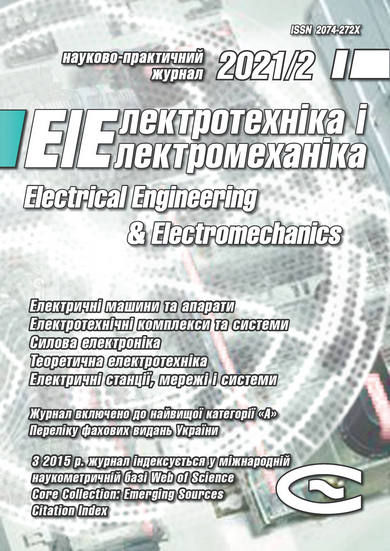Optimization and reliability of the power supply systems of a compressor station
DOI:
https://doi.org/10.20998/2074-272X.2021.2.08Keywords:
power supply system, reliability, optimization, economic aspects, technical aspects, graph theoryAbstract
As gas pipeline systems become larger and more complex, the importance of optimally operating and planning these facilities has increased. The capital costs and operating expenses of pipeline systems are so large that even small improvements in the use of the system can involve large sums of money. Purpose. This article proposes a method to improve the reliability and optimization of power supply systems for compressor stations. The novelty of the proposed work is the development of a new mathematical model that allows the choice of the most appropriate maintenance policies in the best way to significantly reduce costs as well as to optimize useful key performance indicators – failure rate, average time between breakdowns, the average repair time for equipment in compressor station electrical supply systems. Applying graph theory to represent this mathematical model from the schematic diagram of the different energy sources with respect to the five compressor stations is adequate. Methods. The problem that arises for the future operator or operator is, among others, how to balance two main aspects: a technical aspect and an economic aspect. The proposed methodology introduces a research algorithm to calculate the optimal values of the operating parameters of the power supply systems of compressor stations by combining technical and economic aspects in order to reduce costs and increase performance indicators. The proposed algorithm can be implemented in FORTRAN code. Results. The algorithm developed is an efficient tool for calculating maintenance costs and allows by means of programming to define the most appropriate maintenance policy. On the other hand, this technique could be used as an essential economic evaluation indicator for other equipment in order to choose among all the technically possible solutions the one which allow obtaining the best economic result. Practical value. The proposed algorithm has been examined in this third variant of the supply system with two turbogenerators. The result of the optimization shows a clear preference for selecting station C for the pipeline as this presents the minimum cost which is the definition of the algorithm optimizer. Then, it is important to adopt the most recommended maintenance policies and practices in order to ensure the availability of the power supply systems and to avoid unplanned outages with the resulting loss of production.
References
Tikhomirova E. Provision of electric power to CS of TGP, using renewable energy sources (on the example of wind turbines). Master of science thesis EGI, KTH, The Royal Institute of Technology, School of Industrial Engineering and Management, Stockholm, 2012, 86 p. Available at: https://www.diva-portal.org/smash/get/diva2:617506/FULLTEXT01.pdf (accessed 20.10.2020).
Ríos-Mercado R.Z., Borraz-Sánchez C. Optimization problems in natural gas transportation systems: A state-of-the-art review. Applied Energy, Jun. 2015, vol. 147, pp. 536-555. doi: https://doi.org/10.1016/j.apenergy.2015.03.017.
Luongo C., Gilmour B., Schroeder D. Optimization in natural gas transmission networks: A tool to improve operational efficiency. Proceedings of the Third SIAM conference on optimization, Boston, USA, 1989.
Turysheva A.V., Baburin S.V. Justification of power supply system’s structure of oil and gas facilities using backup energy sources with associated petroleum gas as the energy carrier. International Journal of Applied Engineering Research, 2016, vol. 11, no. 1, pp 749-755. Available at: https://www.researchgate.net (accessed 20.10.2020).
Kurz R., Lubomirsky M., Brun K. Gas Compressor Station Economic Optimization. International Journal of Rotating Machinery, vol. 2012, article number 715017, 9 p. doi: https://doi.org/10.1155/2012/715017.
Bansal R.C. Optimization methods for electric power systems: An overview. International Journal of Emerging Electric Power Systems, Jan. 2005, vol. 2, iss. 1, article number 1021. doi: https://doi.org/10.2202/1553-779x.1021.
Baburin S.V., Kovalchuk M.S. Analysis of power supply systems reliability for gas pumping compressor stations. 2018 IEEE Conference of Russian Young Researchers in Electrical and Electronic Engineering (EIConRus), Moscow and St. Petersburg, Russia, 2018, pp. 566-569. doi: https://doi.org/10.1109/eiconrus.2018.8317161.
Massim Y., Zeblah A., Benguediab M., Ghouraf A., Meziane R. Reliability evaluation of electrical power systems including multi-state considerations. Electrical Engineering, Aug. 2004, vol. 88, no. 2, pp. 109-116, doi: https://doi.org/10.1007/s00202-004-0262-2.
Prévision de consommation d’électricité à moyen terme. Direction de planification SONELGAZ, Juin 1984. (Fra).
Military Handbook 338. Electronic Reliability Design Handbook, October 1998. Available at http://everyspec.com/MIL-HDBK/MIL-HDBK-0300-0499/MIL-HDBK-338B_15041 (accessed 20.10.2020).
Villemeur A. Sûreté de fonctionnement des systèmes industriels : fiabilité, facteurs humains, informatisation. Paris: Eyrolles, 1988. (Fra).
Pages A. Fiabilité des systèmes d’alimentation électrique. Paris, 1980. (Fra).
Downloads
Published
How to Cite
Issue
Section
License
Copyright (c) 2021 N. Benchouia , M. Saaidia

This work is licensed under a Creative Commons Attribution-NonCommercial 4.0 International License.
Authors who publish with this journal agree to the following terms:
1. Authors retain copyright and grant the journal right of first publication with the work simultaneously licensed under a Creative Commons Attribution License that allows others to share the work with an acknowledgement of the work's authorship and initial publication in this journal.
2. Authors are able to enter into separate, additional contractual arrangements for the non-exclusive distribution of the journal's published version of the work (e.g., post it to an institutional repository or publish it in a book), with an acknowledgement of its initial publication in this journal.
3. Authors are permitted and encouraged to post their work online (e.g., in institutional repositories or on their website) prior to and during the submission process, as it can lead to productive exchanges, as well as earlier and greater citation of published work.





